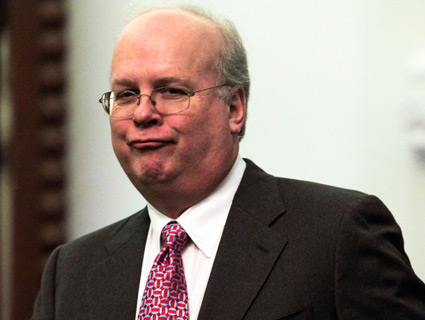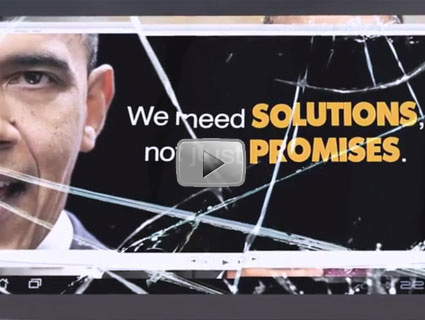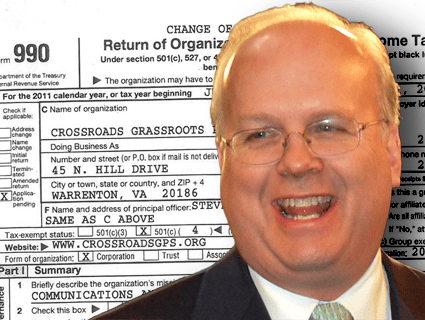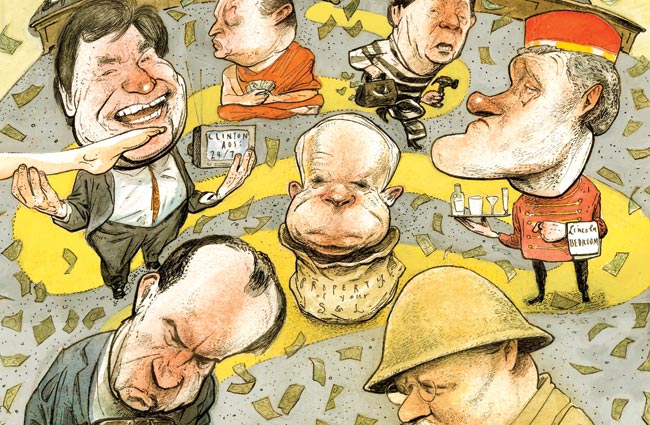
Tom Reel/San Antonio Express-News/ZUMA Press
For all the headlines and hand-wringing about super-PACs, it is dark-money nonprofits like Karl Rove’s Crossroads GPS and Americans for Prosperity that dominate the political money wars. These politically oriented groups, which keep their donors secret, outspent super-PACs 3-to-2 in the 2010 elections. Through the spring of 2012, 91 percent of advertising by independent groups came from nonprofits and big business trade groups. And a growing pile of evidence suggests that it’s these nonprofits, not super-PACs, hauling in the bulk of corporate political cash.
But come Saturday, the dark-money nonprofits face a dilemma. A high-profile court case known as Van Hollen v. FEC threatens to shine an unwelcome beam of sunlight on donors bankrolling these organizations. Nothing’s stopping Crossroads GPS or AFP from running more “issue” ads hitting Obama and other Democrats (that is, ads that don’t explicitly say “vote for” or “vote against”). Except now nonprofits will have to reveal who funded those spots.
Dark-money nonprofits don’t want to name names. Their pitch to donors includes the promise of anonymity and a shield from public scrutiny. This means that Crossroads GPS and other politically active nonprofits—which aren’t supposed to make politicking their primary purpose—have to rethink their ad strategy, election experts say. Do they shift money to super-PACs? Go dark in the months before the election? Find another loophole to run ads and keep their donors secret?
Tax and election law experts say that, short of shutting down, any new strategy carries significant risks. Run-ins with the Internal Revenue Service or the Federal Election Commission, the federal elections watchdog, could be on the horizon. “It’s a tough strategic choice for these groups,” says Joseph Birkenstock, an election law attorney and former chief counsel at the Democratic National Committee.
Here’s the quick-and-dirty version of how nonprofits including Crossroads GPS, Americans for Prosperity, and pro-Obama Priorities USA, among others, ended up in this bind. Until recently, nonprofits had exploited a federal loophole allowing them to run issue ads without disclosing the sources of their funding. These so-called social welfare organizations may also run ads directly backing or opposing candidates, but can’t run too many of them at the risk of running afoul of the IRS for being too political.
In 2011, Rep. Chris Van Hollen (D-Md.) and pro-reform advocacy groups sued the Federal Election Commission to close that loophole. This March, a federal district court judge agreed with Van Hollen, and a second federal judge refused to stay that decision. The loophole was gone. (The case is currently on appeal.)
In other words, the rule book has changed mid-election for politically active nonprofits, and the first effects will be felt Saturday. Now, if AFP or Priorities USA runs a TV or radio ad mentioning Obama or Romney without endorsing or opposing a candidate, the group’s donors must be named. Starting in early September, if they mention any federal candidate, donors must be named.
One dark-money heavyweight, the US Chamber of Commerce, has already said it will change its game plan. As Chamber president Tom Donohue explained in May, the Chamber will no longer run the thinly veiled “issue” ads mentioning a candidate that it did in 2010 and 2011. Instead, the group—which says it’ll spend $50 million during the 2012 cycle—will run ads outright urging voters to oppose or support a candidate. The Chamber can get away with this because, after decades of conservatives and libertarians chipping away at the law, a loophole opened letting donors escape disclosure for “vote for” and “vote against” ads by nonprofit groups.
Donohue told reporters that the Chamber would refuse to let its donors be outed. Efforts to unmask the Chamber’s donors, he insisted, are an effort “to intimidate people from participating” in politics. Van Hollen, one of Congress’ most vocal supporters of disclosure, fired back by saying the Chamber’s shift shows the “extraordinary…lengths these groups will go to in order to hide the sources of their funding.”
The Chamber’s strategy comes with risks. Marc Owens, a tax attorney and former director of the IRS division that monitored nonprofit groups, says those who mimic the Chamber by running “vote for” or “vote against” ads must be careful not to go overboard. After all, tax law requires 501(c)(4) nonprofits to prove that the majority of their work benefits the community at-large, not a single candidate or party. Running too many overtly political ads, Owens says, could imperil the group’s tax status, which prevents them from making politicking their primary focus.
Crossroads GPS spokesman Jonathan Collegio declined to say if and how his group’s strategy would change. “Crossroads is aware of the key dates, and closely follows all law and regulations that govern the process,” he said in an email.
An official at Americans for Prosperity, the conservative nonprofit founded by David Koch, says AFP brass have met multiple times to discuss how to tweak the group’s ad strategy. One option that’s been discussed is ramping up the group’s online advertising, which isn’t affected by the beefed-up disclosure rule. The staffer stressed that any option forcing AFP to name its donors is off the table. The staffer added, however, that AFP would not go dark on the airwaves in the run-up to the November elections: “We’re going to continue to be on the air and continue to follow the law, and we’re gonna protect the identity of our donors.”
Nonprofits could always gamble that the slow-moving IRS and gridlocked FEC won’t target them even if they flout the law. And if they’re caught, the blowback would be relatively minimal when compared with the potential for political gain, says Rick Hasen, an election law expert at the University of California-Irvine. It’s unlikely that the IRS or FEC would crack down on lawbreakers before Election Day. And if a group got slapped with a six- or seven-figure fine after the election, or had to shut down, that’s hardly the end of the world, Hasen says. “If a nonprofit has to sacrifice its name and pay a fee,” he says, “and it helps keep the House, win back the Senate, and take back the White House, that’s a small price to pay.”

















